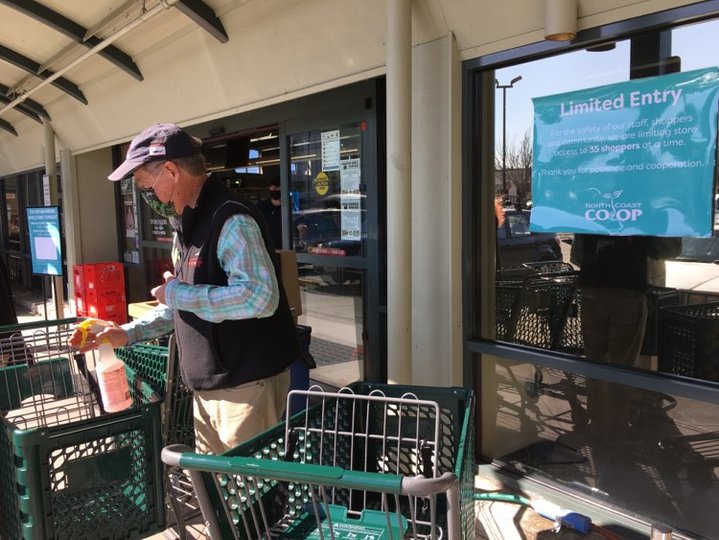
An employee sanitizes shopping carts outside of the North Coast Co-op in Arcata | Stephanie McGeary
Grocery store employees have been helping customers, stocking shelves and wiping down carts on the frontlines of the pandemic for a year now, which is why the United Food and Commercial Workers union is fighting for grocery stores to pay their workers a little bit more.
At its Wednesday night meeting, the Arcata City Council will consider drafting an ordinance that would require large grocery stores to provide “hazard pay” for their employees, a request that was brought forward by the local chapter of the United Food and Commercial Workers, UFCW Local 5.
“We want to level the playing field for all grocery workers,” Local 5 North Coast Director John Frahm told the Outpost in a phone interview Tuesday. “Grocery workers have continued to show up for the public and put themselves and their families at risk.”
Several California cities have recently passed hazard pay ordinances, including San Francisco, Oakland, Long Beach and Los Angeles. The amount of the pay increase, duration of the ordinance and what types of businesses are subject varies a bit across the state. While some cities have based the hazard pay requirement solely on the businesses’ number of employees, Oakland’s ordinance, for example, applies to grocery stores larger than 15,000 square feet.
Locally, the UFCW has requested that the ordinance apply to “any large retailer that sells a minimum of 10 percent food,” Frahm said. Grocery stores with 15 or more employees locally or 500 or more employees nationwide would be required to pay an additional $4 per hour, and stores with more than 25 but less than 500 employees locally would pay workers an additional $3 an hour. The request is for the ordinance to last for at least 90 days, or until the county moves into the yellow tier.
If the council chooses to move forward, however, it would decide the exact parameters of the ordinance, including the duration, the amount of pay increase and how to determine which businesses would be subject.
The ordinance would not be meant to impact small businesses that may be struggling, Frahm said, but to target the large companies that have seen an increase in profits since the onset of the pandemic. Brookings Institution reported that the 13 largest retail and grocery store companies in the United States earned $17.7 billion more in the first three quarters of 2020 than they did in 2019. And though many larger grocery stores were offering “hero pay” to their employees earlier in the pandemic, most discontinued the pay last summer.
Frahm says that the UFCW hopes to ensure those stores’ profits are passed on to the employees, who are risking exposure to COVID-19 and many of whom have been continuing to show up to work while juggling family obligations.
“Employers have reaped the profits without sharing them with those who have put themselves at risk,” Frahm said. “With our jobs, you can’t work from home. We’ve been there on the frontlines.”
###
In other business, the council will receive an update on the city’s Rental Inspection Program.
“The purpose of the Residential Rental Inspection Program is to address the issue of substandard long-term rental properties, promote greater compliance with health and safety standards and preserve the quality of Arcata’s neighborhoods and available housing,” the staff report states. “The program achieves compliance of health, safety and welfare code violations in/on residential rental properties that are a threat to the occupant’s safety, structural integrity of the building, and a negative impact on the surrounding neighborhoods.”
The Arcata City Council meets over Zoom on Wednesday, March 17 at 6:00 p.m.
You can view the full agenda and directions on how to participate here.
CLICK TO MANAGE